Football Association report says Luis Suarez evidence 'unreliable'
- Published

Suarez was handed an eight-match ban for racially abusing Evra
Luis Suarez gave "unreliable" evidence to the body that was investigating claims he racially abused Patrice Evra, according to a report published by the Football Association.
Liverpool's Suarez was given an eight-match ban and a £40,000 fine after he clashed with Manchester United's Evra., external
The report, external says Suarez has "damaged the image of English football around the world".
Two similar offences in future could lead to "a permanent suspension".
The incident happened during the 1-1 draw at Anfield on 15 October.
The report states that, after being tackled by the Uruguayan, Evra asked Suarez why he had kicked him, to which the forward replied in Spanish: "Because you are black."
When Evra challenged him to repeat the answer and said he would "punch him", Suarez said: "I don't speak to blacks."
Suarez is said to have used the term "negro" seven times in around two minutes.
In giving the reasons for the length of the ban, the report said: "Given the number of times that Mr Suarez used the word 'negro', his conduct is significantly more serious than a one-off use of a racially offensive term and amounts to an aggravating factor."
The FA and Liverpool were given the findings on Friday by the Independent Regulatory Commission. Both parties have the right to an appeal and must reply by 13 January.
The 115-page document details the conversation between the two players.
The report concludes: "Mr Evra was a credible witness. He gave his evidence in a calm, composed and clear way.
"It was, for the most part, consistent, although both he and Mr Suarez were understandably unable to remember every detail of the exchanges between them.
"Mr Suarez's evidence was unreliable in relation to matters of critical importance. It was, in part, inconsistent with the evidence, especially the video footage.
"For example, Mr Suarez said that he pinched Mr Evra's skin in an attempt to defuse the situation. He also said that his use of the word 'negro' to address Mr Evra was conciliatory and friendly. We rejected that evidence.
"To describe his own behaviour in that way was unsustainable and simply incredible given that the players were engaged in an acrimonious argument.
"That this was put forward by Mr Suarez was surprising and seriously undermined the reliability of his evidence on other matters.
"There were also inconsistencies between his accounts given at different times as to what happened."
Suarez was found guilty on the "balance of probability" - a lower standard than the criminal standard of "beyond all reasonable doubt".
According to the report, Evra admitted that he begun the exchange with Suarez by referring to the Uruguayan's sister in Spanish.
The report added: "After the referee Andre Marriner separated them, Mr Suarez said that he turned to Mr Evra and said, 'Por que, negro?'
"He [Suarez] said that he used the word 'negro' at this point in the way that he did when he was growing up in Uruguay, that is as a friendly form of address to people seen as black or brown-skinned or even just black-haired.
"He [Suarez] said that he used it in the same way that he did when he spoke to Glen Johnson, the Liverpool player.
"He [Suarez] said in no way was the use of the word 'negro' intended to be offensive or to be racially offensive. It was intended as an attempt at conciliation."
The entire conversation took place in Spanish and linguistic experts Professor Peter Wade and Dr James Scorer helped the panel with the meaning of the phrases.
The commission added: "In our judgment, Mr Suarez's use of the term [negro] was not intended as an attempt at conciliation or to establish rapport; neither was it meant in a conciliatory and friendly way."
In the report, Suarez claimed: "I would refer to Glen Johnson as 'negro' in the same way that I might refer to Dirk Kuyt as 'Blondie' - because he has blond hair, or Andy Carroll as 'Grandote' - 'Big Man' - because he is very tall.
"Where I come from it is normal to refer to people in this way by reference to what they look like. There is no aggression in referring to somebody in this way and there is certainly no racial connotation."
After the match Evra and United manager Sir Alex Ferguson both spoke to the referee about the incident, while Liverpool manager Kenny Dalglish remarked to referee Marriner in reference to Evra, "Hasn't he done this before?"
Despite the punishment, the commission conceded: "This case is not about whether Mr Suarez is in fact a racist. Indeed, the commission will no doubt conclude that there are some indications that he is not."
Suarez's defence was that he had been called "South American" in a derogatory way by Evra. But the commission added: "We found that Mr Evra did not use the words 'South American' when speaking to Mr Suarez."
Evra, Ryan Giggs, Kuyt, Liverpool's director of football Damien Comolli and Dalglish all gave evidence at the hearing.
After the initial ban was announced on 21 December, Liverpool's players wore T-shirts to support the Uruguayan, external while warming up for their match against Wigan. A day earlier the Anfield club released a statement, external saying they were "very surprised and disappointed with the decision of the Football Association commission to find Luis Suarez guilty of the charges against him".
- Published17 October 2011
- Published16 October 2011